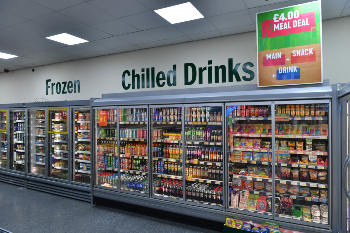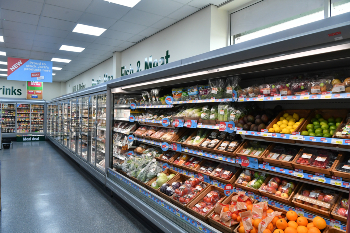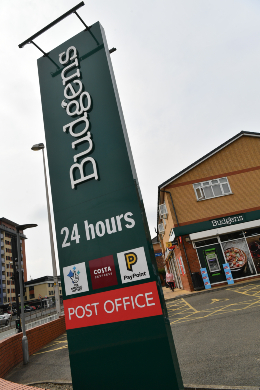Print
in Special Reports 5th September 2022
It may be 150 years since John Budgen opened his first grocery store in Ealing, west London, in 1872, but for the past 20 years at least, the symbol group’s stores have been known for their typically upmarket formula – fresh-led, small supermarkets of more than 5,000sq ft selling, as one observer puts it, “thirteen different kinds of olive”.
As a result, the group was often referred to within the trade as “the Waitrose of convenience”.
So, when you come across a former Co-op in the mixed-affluence suburb of Rowley Regis, on the outskirts of Birmingham, the fact that it is trading under the Budgens fascia might come as a bit of a surprise.
Special offers
The 24-hour store, bought from the Co-op three years ago by serial entrepreneur Mohan Samy, comes in at just under 3,000sq ft and the overwhelming impression on entering the shop is its emphasis on value.
Stacks of beer and cider close to the entrance offer 10x440ml cans for £10, down from £15.99, while red-and-yellow hanging signs shout “Special Offer” above each of the aisles.
There are a couple of £5 meal deals in the frozen section and a large bay of sharing confectionery plastered with shelf-edge labels and barkers advertising the fact that all products are priced at just £1.
Also in evidence are large numbers of price-marked packs, something Budgens retailers 10 years ago would never have touched.
Another big focus is on Jack’s, the discount brand created by Tesco in 2018 and originally intended to compete with Aldi and Lidl.
After an unsuccessful trial as a standalone fascia in both large and small-store formats, Jack’s has now morphed into a mid-tier own-label offer that, for the Booker group, is replacing previous own-brands Happy Shopper, Farm Fresh, Discover the Taste and Discover the Choice, although some 100 Euro Shopper lines have been retained as an entry level alternative.
Take-away section
Also close to the entrance of the Rowley Regis outlet is a large food-to-go station featuring a Costa Express coffee machine, Rollover hotdogs, F’real milk shakes, Fwip ice-creams, Tango Ice Blast, Bake & Bite, and even a small Dunkin Donuts module.
Apart from the coffee machine and a freshly squeezed orange juice unit, again it is not the sort of offer you might expect to find in a Budgens store.
Samy – who operates some 40 stores nationwide, including many trading as Budgens and Londis – says he chose to go with Budgens for the Rowley Regis site because “we needed someone who really got fresh”.
This was particularly important as the store had formerly been a Co-op and shoppers were used to a decent offer in that department. A further consideration was the group’s willingness to be flexible when it came to fitting out the store. Rather than starting from scratch, with a typical fit-out cost of £200,000 to £300,000 for an empty unit, Samy was able to use the existing fixtures and fittings from the Co-op. So, with some support from Budgens, he only had to fork out between £20,000 and £30,000 for the refresh.
Rather than starting from scratch, with a typical fit-out cost of £200,000 to £300,000 for an empty unit, Samy was able to use the existing fixtures and fittings from the Co-op. So, with some support from Budgens, he only had to fork out between £20,000 and £30,000 for the refresh.
Sales increase
Overall, the approach appears to be working well. From a typical turnover of about £26,000 before the conversion, sales are now standing at more than £50,000 a week. Some 900 shoppers come through the door every day and sales per square foot are about £14.
Samy says it is a classic case of a site where a corporate owner was unable to turn a profit, but where an independent can use their knowledge to create an original offer with a range tailored to the local market and enable the business to operate successfully. “We turned the store around,” he says.
For Booker, the Rowley Regis shop is emblematic of the ongoing shift in emphasis for the Budgens brand, as it evolves from being solely an upmarket format focused on the south-east of England to a nationwide operation that can cater to both affluent shoppers and those on a budget.
That shift has been enabled in part by the fact that Budgens stores are now supplied via the same network of distribution centres as Londis, meaning it is now able to push further into the north of England and Scotland.
For Stewart Fenn, sales director across both Budgens and Londis, the biggest impact so far has come from the introduction of Jack’s, which already has more than 400 lines rolled out, with the remaining 100 due to land shortly. The range is fully price-marked but promises retailers a full 30% profit-on-return, guaranteed to be as good as, or better than, the outgoing ranges.
Game-changer
Jack’s also now features the words “Part of the Tesco family” on the front of pack, designed to offer consumers the reassurance of Tesco quality at a competitive price.
Fenn says: “The fruit and veg in particular has been a bit of a game-changer in terms of quality. We are now looking at really driving it. We are starting to dial up the promotions and the social media.
“We’ve already come a long way in a short space of time.” If the experience at Rowley Regis is anything to go by, then then approach should prove successful. Fresh sales at the store have grown by some 30% since the Jack’s range was introduced some three months ago, according to Samy.
If the experience at Rowley Regis is anything to go by, then then approach should prove successful. Fresh sales at the store have grown by some 30% since the Jack’s range was introduced some three months ago, according to Samy.
Fenn says one of the biggest challenges for the group was around fresh promotions. “There were a lot of grumblings behind the scenes,” he admits, with many traditional Budgens retailers asking for more to be done.
Along with everyday low pricing, Booker has now introduced a “Fresh 4” deal on produce (not unlike Aldi’s regular “Super 6” promotion). “Budgens has always been famous for premium fresh foods and now we are building on the value end as well.”
Retailer toolkit
Further help for retailers is available through Budgens’ ongoing “Fit for the Future” toolkit, which is offering them ways to “Make more, save more”, including a rebate scheme worth up to £27,300 a year and its Coffee Club, which promises an additional rebate depending on how many cups they sell.
There is also a special rate on Barclaycard transactions and a group deal being negotiated on energy prices, with savings dependent on how many retailers sign up.
All in all, says Booker, a retailer could save up to £154,000 a year if they take advantage of all the extra sales opportunities, deals and savings on offer.
The focus now is on growing the number of stores belonging to the symbol group, which currently stands at 360 members.
“Ideally, we want to recruit 150 Budgens retailers this year, and we’re on track to do that,” says Fenn. “We have had a record start to the year with about 30 signed up already and 36 in the pipeline.
“With our other prospects, that should get us to around 120 and we should be able to get to 150 by the end of the year. It’s a really big target, but what I would say is we have a lot of people knocking on the door at the moment.”
Red lines
 This ambition is helped not only by the increased geographical spread thanks to the new distribution set-up but also by the fact that the brand is now looking at a “sweet spot” in terms of floor space of between 1,500sq ft and 5,000sq ft.
This ambition is helped not only by the increased geographical spread thanks to the new distribution set-up but also by the fact that the brand is now looking at a “sweet spot” in terms of floor space of between 1,500sq ft and 5,000sq ft.
However, some “red lines” remain, says Fenn, with stores needing to be at least 1,500sq ft and having a minimum seven bays of chilled fresh produce, plus one ambient bay, as the format remains fresh-led. “We have been able to demonstrate that Budgens can work in more locations than it has previously.
Our traditional stores are still a very important part of our business, but we have now got a model that can be flexible. It used to be only a fresh-led, supermarket format rather than convenience and neighbourhood, but now it can work in different locations and do different things.”
National ambition
Much of the interest from store owners is coming from the north of England and Scotland, where the group already has its first outlet, in Elgin, Moray, which opened last November.
“We can be national,” says Gavin Claxton, head of retail for Booker Retail Partners, but he too believes Budgens needs to broaden its appeal, not just to recruit new members but also to cater for its traditional retailers who have also been telling the group they can no longer survive by only focusing on the top end of the market.
“We’re still keeping what Budgens is famous for and the essence of Budgens, but you can’t stand still. It’s evolution and moving things forward,” he says. “Let’s build on that, but let’s move it up as well. This is something we can put into the majority of our estate.
Budgens for me is a fresh-food-led convenience business but we have got to make sure that’s up to date. Five years ago, for example, a Budgens retailer would never have dreamed of putting in food-to-go. They would say, for example, that ABC1 consumers don’t buy milkshakes from a machine. But we have to realise our consumer has shifted, and we have to adapt.”
Tagged with: budgens
or a new account to join the discussion.
Your guide to building a better business
By using this website you are consenting to the use of cookies. Talking Retail is owned by Metropolis International Group Limited, a member of the Metropolis Group; you can view our privacy and cookies policy here.